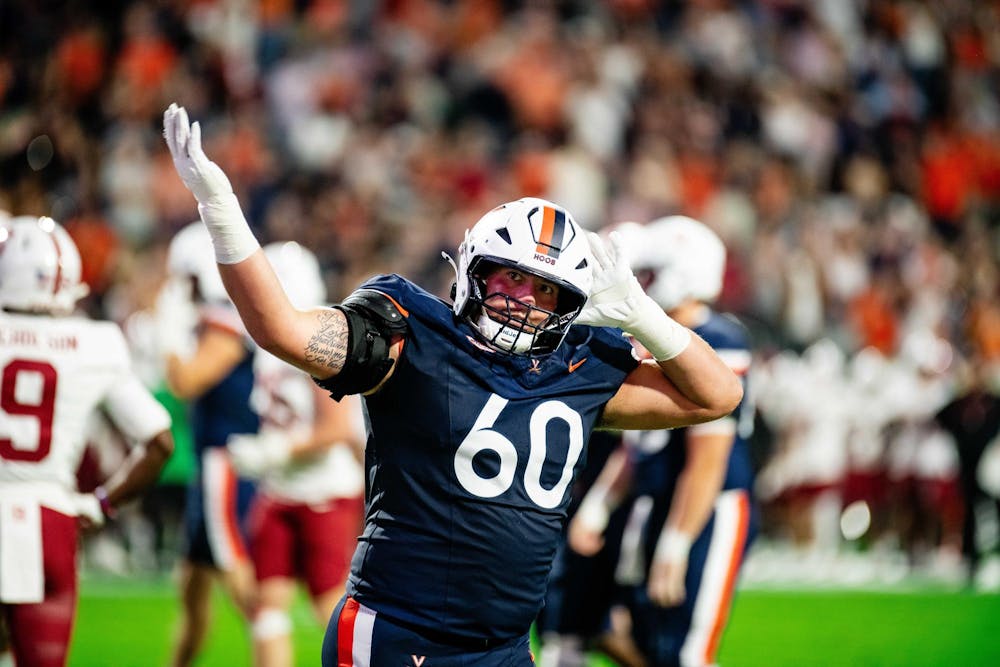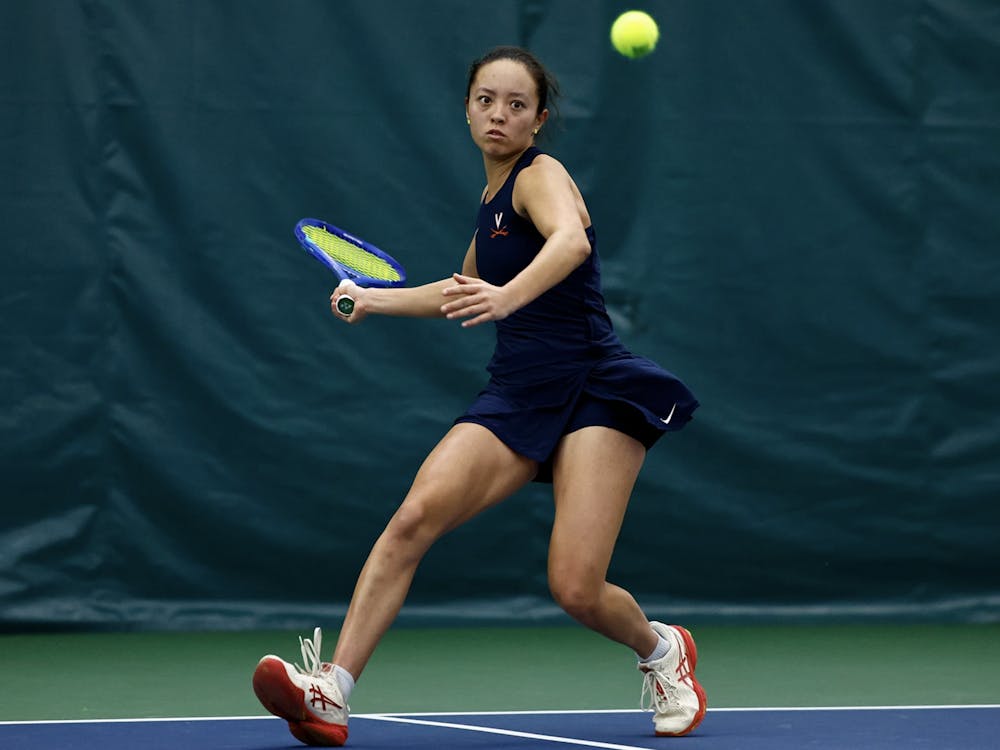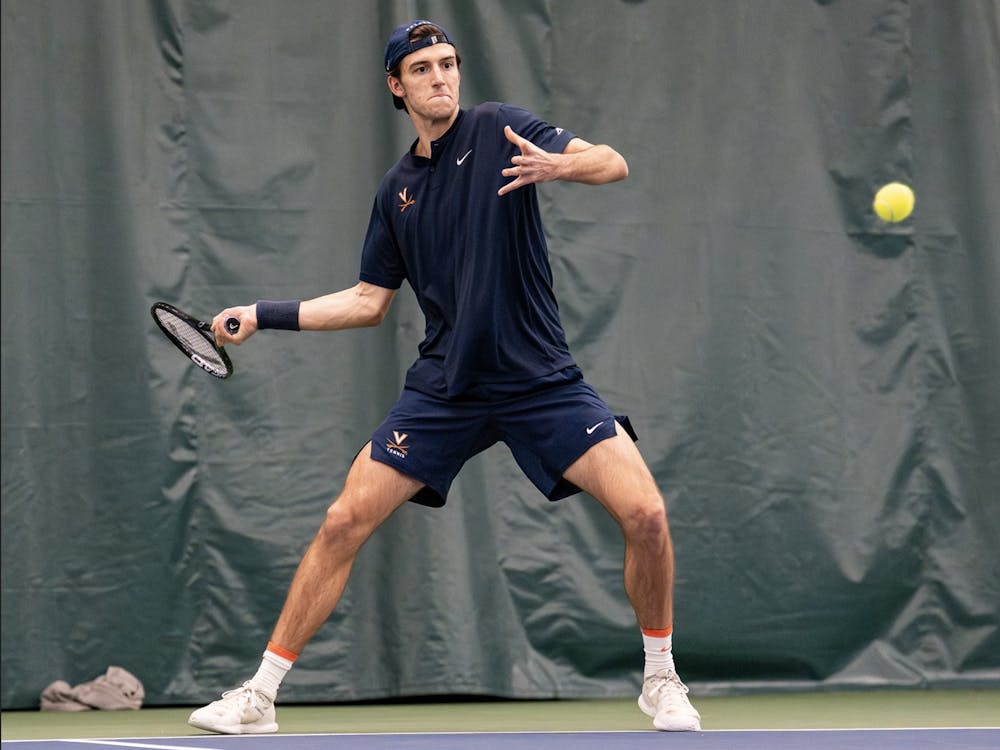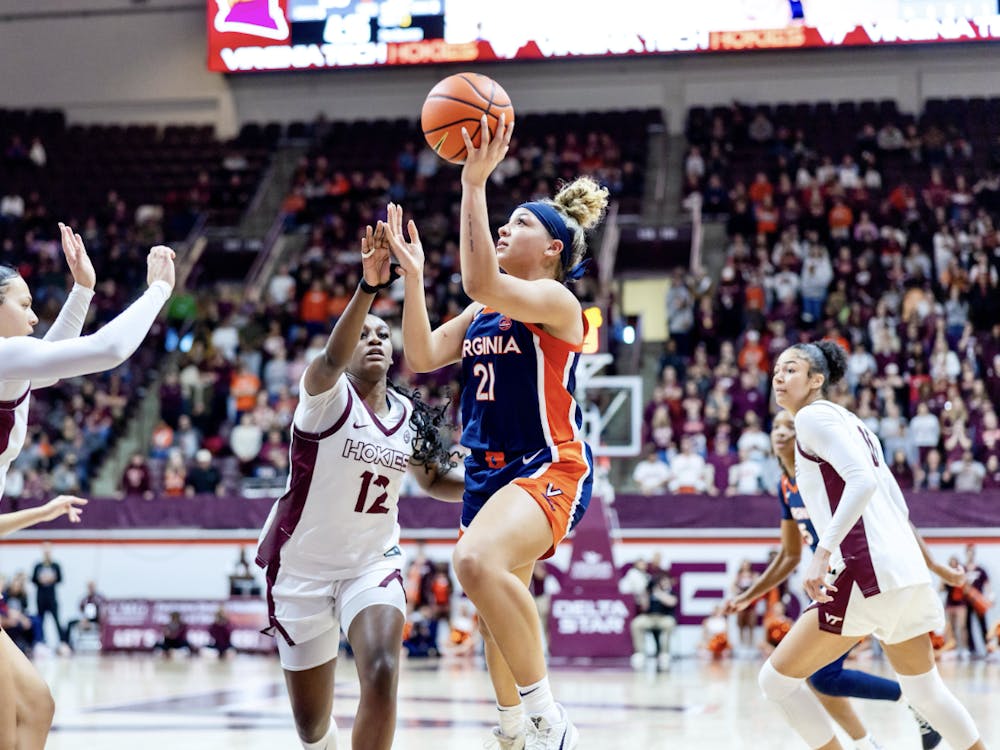Filling in at the center position, graduate offensive lineman Drake Metcalf is a conductor — the rest of the offense, his orchestra. Pre-play, he raises his baton. The snap count from graduate quarterback Chandler Morris is like a beating drum, setting a tempo for the other 10 instrumentalists in orange and blue. He snaps the ball.
A once calm scene turns cacophonous. 300-pound bodies slam into one another. Receivers sprint for just an inch of separation. Morris’s eyes dart from sideline to sideline. To most, any existing beauty is lost in the utter chaos. But to Metcalf, that mayhem is a symphony.
One might be surprised to learn that Metcalf was never supposed to be this team’s center. He began 2025 as the Cavaliers’ right guard, but an injury to graduate offensive lineman Brady Wilson shifted Metcalf to center for seven halves — and three overtime periods — of Virginia football. And though it is just one spot over on the line, the shift is not always a simple one.
As offensive coordinator Des Kitchings noted, guard and center are quite different. A center receives the play calls, and must lead the offensive line whereas the guard is among those who are led.
“[Metcalf] had to up his preparation to know the defensive structure from a center standpoint — because now he's in control of everything,” Kitchings said.
A transfer in the 2023-24 offseason from Central Florida, the graduate student was sidelined all of last year due to injury. The lineman’s first start at center since arriving in Charlottesville came against then-ranked No. 8 Florida State.
“I sat with the guys for so many hours,” Metcalf said. “I had extra meetings with [offensive line coach Terry Heffernan], extra meetings with [senior offensive analyst Joey Orck]. I sat down with [Wilson] a lot to be like, ‘Hey, I haven't done this in a little while. Let's just go through the points.’”
Luckily for the Cavaliers, Metcalf is far from inexperienced at the position. He was recruited to Stanford — his first collegiate destination — as a center, splitting time between the center and guard spots throughout three years with the program. It was at Stanford where Metcalf met Heffernan, spending two seasons together before reuniting at Virginia. Heffernan has been with Virginia since 2023 and a Metcalf reunion has paid dividends, especially in a pinch with a backup center needed.
Aware that a scenario like shifting to a different position could arise, Heffernan crosstrained Metcalf at center. That experience has proven crucial in transitioning to a role so highly dependent on football IQ.
“Sometimes, the center will have to slow down,” Metcalf said. “[And] really look at the defense and see, ‘Okay, here's where the safeties are hanging right now,’ or ‘They're rotated strong,’ or ‘They're rotated weak. Here's how that changes our identification of who we're working to for any given scheme.’”
That intelligent perspective is a testament to years spent with Heffernan. Perhaps those shared Stanford years gave the coach confidence in the graduate student to handle a typically complex and mentally demanding transition with ease. It is easy to see why Heffernan would not be concerned.
Metcalf is a highly intelligent player. Often, you hear coaches describe players as students of the game. If Metcalf’s academic record were any indication, he may warrant an even more complimentary term. The lineman graduated from Stanford with a bachelor’s in Political Science in just three years. But his student-athlete experience transcended just the field and the classroom. Prior to his graduation, Metcalf interned at Stanford’s Hoover Institution, a public policy think tank on the university’s campus.
“All those experiences have really shaped and transformed my vision of working in politics,” Metcalf said. “And I think that's something that I still really want to do down the road, whether it be holding a congressional seat or potentially working in lobbying or maybe a nonprofit.”
Now, the offensive lineman is pursuing a master’s degree from the Frank Batten School of Leadership & Public Policy, where he has had the chance to experience the last of those career possibilities first-hand. For his applied policy project this semester, Metcalf is working with the nonprofit Living Free Together, an organization that helps veterans and their families readjust to life after military service.
“[The project] is really surrounding veterans mental health care initiatives,” Metcalf said. “So, I can see myself getting into that down the road, just because my passion for that lies so deeply rooted in the experiences that I've had.”
Veterans, like the lineman’s grandfather, have always been important to Metcalf. After all, Metcalf’s introduction to the musical world came not during a football game but rather from his veteran grandfather’s military funeral.
“He's buried at Riverside National Cemetery in California, and we had the bagpipes played there for his funeral,” Metcalf said. “I thought it'd be awesome to be able to learn them in honor of him and our Scottish history and heritage on my dad's side of the family.”
Metcalf picked up the bagpipes at age 12 and has stuck with them since — though he tries not to make too much noise. Every couple of days, when he has free time, Metcalf plays the bagpipes in his apartment.
It is apt that Virginia football’s conductor has such musical experience.
But as of Saturday at North Carolina, the graduate student shifted back one spot to the right, relinquishing control of the orchestra to a now-healthy Wilson. Metcalf’s 10-movement symphony just finished its coda. And although the Cavalier maestro’s tenure as conductor has come to an end, at least for the time being, his time as an intellectual, a politician and a bagpiper very much has not.
Xander Tilock contributed reporting.







